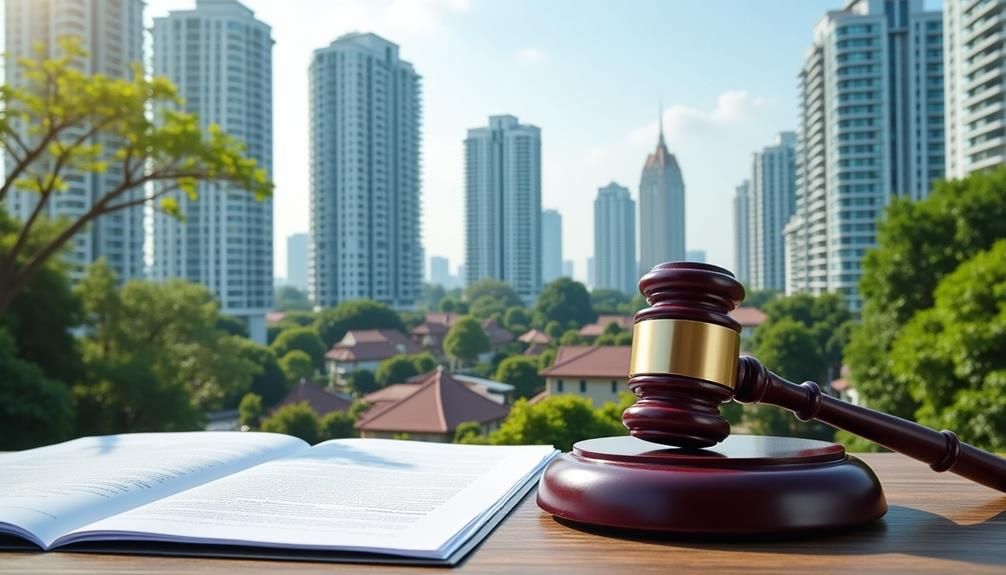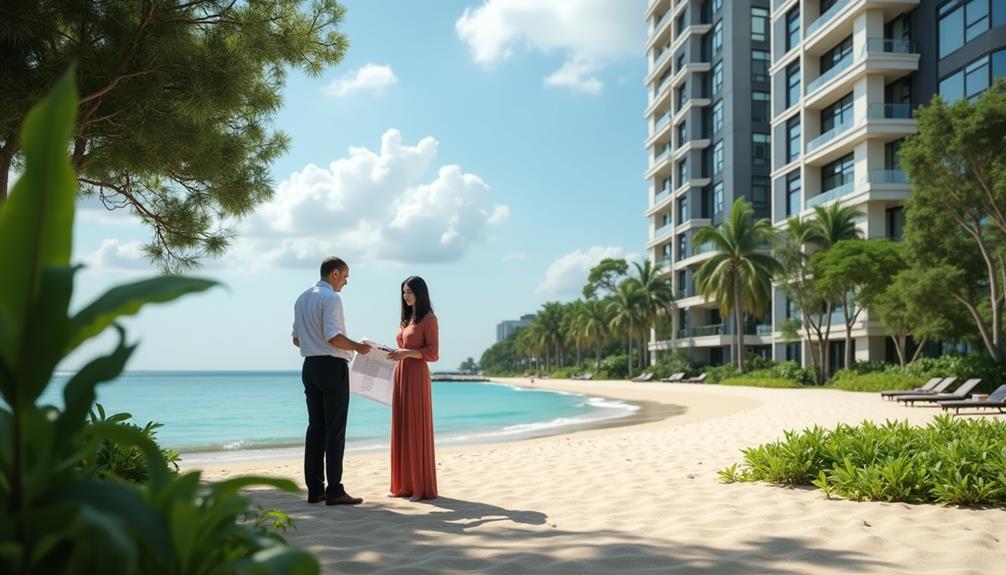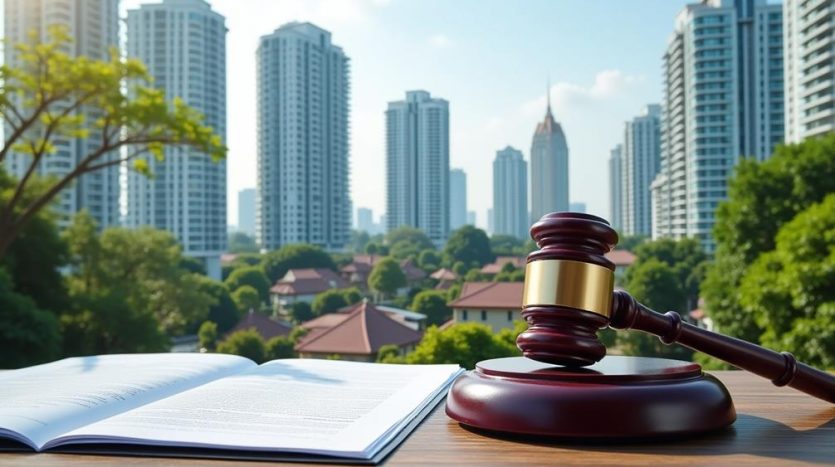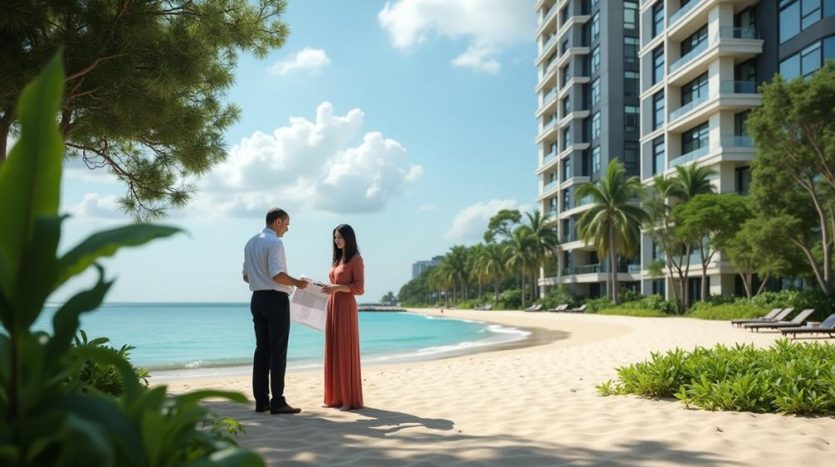Is It Easy to Buy Property in Thailand as a Foreigner?
When considering whether it's easy to buy property in Thailand as a foreigner, you'll quickly find that the process is far from straightforward. While you can own a condominium with certain limitations, direct land ownership is off-limits. Instead, leasehold agreements often become the go-to strategy, but these come with their own set of challenges and restrictions. Maneuvering through the legal landscape, securing financing, and avoiding hidden costs require more than just a casual approach. So, what are the critical steps and potential pitfalls you'll face in this complex endeavor?
Key Takeaways
- Foreigners cannot own land outright but can own up to 49% of a condominium.
- Long-term leaseholds up to 30 years are available with renewal options.
- Establishing a Thai Limited Company allows indirect land ownership.
- Property transactions require navigating complex legal regulations and tax implications.
- Financing options for foreigners are limited and often come with stricter criteria.
Property Ownership Regulations

Understanding property ownership regulations is vital if you're considering buying property in Thailand as a foreigner. Thailand's property market trends can be both enticing and bewildering, making it important to know the rules of the game. While the Land of Smiles is welcoming, it has strict guidelines on foreign ownership.
Don't worry, though—there are still promising investment opportunities available.
Firstly, as a foreigner, you can't own land outright. That might sound like a deal-breaker, but fear not! You can own condominium units, provided foreigners don't exceed 49% of the building's total area. This regulation guarantees a balanced market while offering you a piece of paradise.
Additionally, establishing a Thai Limited Company can enable indirect land ownership, although it involves more complex legal requirements.
Additionally, you can invest in long-term leaseholds, typically up to 30 years, with options for extension. This approach gives you a foothold in the market without needing to navigate ownership restrictions.
Keeping an eye on property market trends can help you make savvy investments. For example, areas like Bangkok and Phuket are hotbeds for growth, offering lucrative returns.
Do your homework, and you might just find a golden investment opportunity in Thailand's vibrant property scene.
Leasehold vs. Freehold
When considering property in Thailand, you'll need to weigh the differences between leasehold and freehold options.
Leaseholds come with ownership time limits, typically up to 30 years, and are subject to renewal complexities.
Freeholds allow more permanent ownership but face stringent foreign ownership restrictions.
Each with distinct legal implications, foreign buyers often opt for leasehold due to the legal complexities and market risks associated with freehold purchases.
Ownership Time Limits
In the domain of property ownership in Thailand, it is vital to grasp the differences between leasehold and freehold arrangements. When you're eyeing property investments, knowing the ownership duration is a game-changer. Leasehold means you're fundamentally renting the property for a set period—usually 30 years—after which it reverts to the owner. Freehold, on the other hand, means you own the property indefinitely, making it a more attractive option if you're planning to hold onto your investment long-term.
To make it clearer, here's a quick comparison:
| Aspect | Leasehold | Freehold |
|---|---|---|
| Ownership Duration | Typically 30 years, renewable | Indefinite |
| Control | Limited by lease terms | Full control |
| Investment Value | Typically lower | Generally higher |
| Renewal Process | Requires renegotiation | Not applicable |
The leasehold option may seem less appealing due to its limited ownership duration and potential renegotiation headaches. But, it can still be a solid choice if you're looking for short-term or medium-term investments. Freehold, while generally more expensive, offers the peace of mind and long-term control that serious property investors crave. So, weigh your options wisely, my friend, because in Thailand, the devil's in the details!
Foreign Ownership Restrictions
To navigate the terrain of foreign ownership restrictions in Thailand, you need to understand how leasehold and freehold options differ for non-Thai nationals.
First off, freehold ownership is the golden ticket, but it's elusive for foreigners. You can only own condo units outright, and even then, foreign ownership is capped at 49% of the building's total floor area. So, if you're dreaming of a house with a white picket fence, think again.
Leasehold, on the other hand, is your more accessible route. You can lease land for up to 30 years, with options to renew. While it doesn't give you the satisfaction of owning the land outright, it still offers substantial investment opportunities. Plus, it's more culturally considerate, acknowledging local sentiments about land ownership.
In essence, your choice boils down to what you prioritize: the pride of ownership with freehold condos or the flexibility of leasehold agreements.
Either way, you'll need to be savvy about the rules to maximize your investment. Be sure to weigh your options carefully, keeping in mind the balance between legality and your long-term goals.
And hey, at least you'll always have a good story to tell at dinner parties.
Legal Implications
Maneuvering the legal implications of leasehold versus freehold in Thailand can feel like a tightrope walk. As a foreigner, you're mostly limited to leasehold arrangements, which typically last up to 30 years.
Freehold ownership, on the other hand, is usually reserved for Thai nationals. You could own a condo freehold, but be prepared for a Rubik's Cube of regulations.
Leasehold might sound like the poor cousin, but it has its perks. For one, it simplifies property management. You won't have to worry about the complexities of long-term maintenance.
On the flip side, the leasehold term renewal process can be cumbersome and might involve renegotiation, which sometimes feels like haggling at a chaotic market.
When it comes to tax implications, leaseholds generally incur fewer taxes upfront. However, keep an eye on renewal fees and potential hikes.
Freehold properties, while more secure in ownership, could attract higher taxes and maintenance costs over time.
Legal Requirements

Maneuvering the legal requirements for buying property in Thailand as a foreigner can be a complex endeavor, but understanding the basics will smooth the process considerably.
First and foremost, you can't buy land directly, but you can own a condo. For condos, verify that at least 51% of the building is Thai-owned. If you're eyeing a house and land, you might consider a long-term leasehold, typically up to 30 years. It's essential to understand foreign ownership restrictions and the available legal avenues, such as investment structures, which can help navigate these challenges.
Property registration is vital. You'll need to register your ownership at the Land Department, which sounds straightforward until you realize the paperwork might rival a small novel.
Don't forget the tax implications. Transfer fees, stamp duty, and specific business tax (if applicable) will be part of your financial responsibilities. You'll also need to show proof of funds, transferred from abroad in foreign currency.
Hiring a local lawyer isn't just a good idea—it's a sanity saver. They'll help you navigate Thai property law, guarantee all documents are in order, and protect your interests.
Financing Options
When it comes to financing your property purchase in Thailand, options might seem limited at first, but understanding them can make a significant difference. You won't find the same mortgage options as you'd at home, but hey, who said buying property in paradise would be straightforward?
To get you started, here are some key financing strategies:
- Local Banks: A few Thai banks offer mortgages to foreigners, but be prepared for strict criteria and a hefty down payment. Think of it as an exclusive club with high entry fees.
- Developer Financing: Some property developers offer financing plans, especially for new projects. These might come with higher interest rates, but they can be more flexible.
- Offshore Financing: If local options aren't cutting it, consider financing from your home country. Some international banks have programs tailored for expats.
- Personal Funds and Savings: The simplest and most straightforward option is to use your own money. This strategy avoids the complications of loans but requires significant upfront capital.
Understanding these investment strategies will help you make an informed decision.
Just remember, in the world of Thai property, flexibility and a sense of humor are essential tools in your financial toolkit!
Common Pitfalls

When buying property in Thailand, you must navigate legal ownership restrictions that limit foreign ownership.
Be aware of financial requirements and hidden costs that can catch you off guard.
Understanding these common pitfalls is essential to making an informed decision.
Legal Ownership Restrictions
Maneuvering Thailand's property market as a foreigner involves understanding several critical legal ownership restrictions. Knowing these rules can save you from nasty surprises and hefty fines. Here's a quick breakdown:
- Land Ownership: You can't directly own land in Thailand. Instead, many opt for leasehold agreements, often lasting 30 years.
- Condo Ownership: Foreigners can own condos, but there's a catch. Only 49% of a condo building's units can be foreign-owned.
- Company Ownership: Setting up a Thai company to buy land isn't a loophole. The company must be majority Thai-owned, meaning you can't control it entirely.
- Tax Implications: Be aware of property taxes and other fees. They can add up and impact your budget more than you'd expect.
Navigating these restrictions is like playing a game of legal Twister. You need to know where to place your feet and hands, or you might fall into the pit of missteps and penalties.
Keep an eye on the tax implications and property taxes to avoid financial pitfalls. Remember, while you can't bend the rules, you can certainly maneuver within them with some clever planning and a good lawyer.
Financial Requirements
Diving into Thailand's property market requires not just legal acumen but also financial prudence. You're not just buying a property; you're maneuvering through a maze of currency exchange and tax implications that can make or break your investment dream.
First off, the currency exchange is a two-headed beast. You've got to time your purchase just right. The Thai baht can be as temperamental as a cat on a hot tin roof. Misjudge it, and you might pay way more than you budgeted for.
Keep an eye on exchange rates like a hawk and use a reputable broker to avoid hidden fees.
And let's not forget about tax implications. Thailand's tax system isn't exactly a walk in the park. Transfer fees, withholding tax, and specific business taxes can sneak up on you if you're not prepared.
Make sure you consult a local tax advisor who knows the ins and outs of Thai property laws. Ignorance isn't bliss here; it's expensive.
In essence, getting your finances right can save you a world of trouble. Plan meticulously, seek expert advice, and keep a sense of humor about the inevitable hiccups. After all, it's all part of the adventure!
Hidden Costs
While mastering the financial landscape is essential, you should also be wary of hidden costs that can catch you off guard. Buying property in Thailand as a foreigner involves more than just the sticker price. Here are some sneaky expenses you need to take into account:
- Property Taxes and Insurance Costs: You might think you've got a great deal, but don't forget about annual property taxes and insurance costs. They can add up fast.
- Maintenance Charges and Inspection Fees: Regular maintenance charges for communal areas and inspection fees for ensuring the property is up to code are often overlooked. These can quickly turn into unexpected expenses.
- Currency Fluctuations and Additional Fees: The Thai Baht doesn't always play nice with foreign currencies. Currency fluctuations can impact your budget, and additional fees for currency exchange can sneak up on you.
- Transaction Costs: Legal fees, stamp duties, and other transaction costs can be a significant chunk of change. Make sure to factor these into your budget.
These hidden costs can turn your dream property into a financial nightmare if you're not careful.
Tips for Success
A few essential tips can greatly improve your chances of successfully buying property in Thailand as a foreigner. First, understand the local market. It's not just about finding a pretty condo by the beach; you need to know the trends, prices, and legalities. Familiarize yourself with property management options to guarantee your investment is maintained properly if you're not always there.
Here's a quick cheat sheet to help you navigate this process:
| Tip | Details |
|---|---|
| Research the Local Market | Understand pricing trends, popular areas, and legal restrictions. |
| Hire a Reputable Lawyer | They'll guide you through the legal maze, ensuring all paperwork is legit. |
| Consider Property Management | Essential if you plan on being an absentee owner. They handle maintenance. |
Hiring a reputable lawyer can't be overstated. They'll make sure you don't get tangled in red tape or discover nasty surprises post-purchase. Finally, think about property management services. If you plan to be away, having someone reliable to handle maintenance, tenant issues, and bills can save you a lot of headaches.







